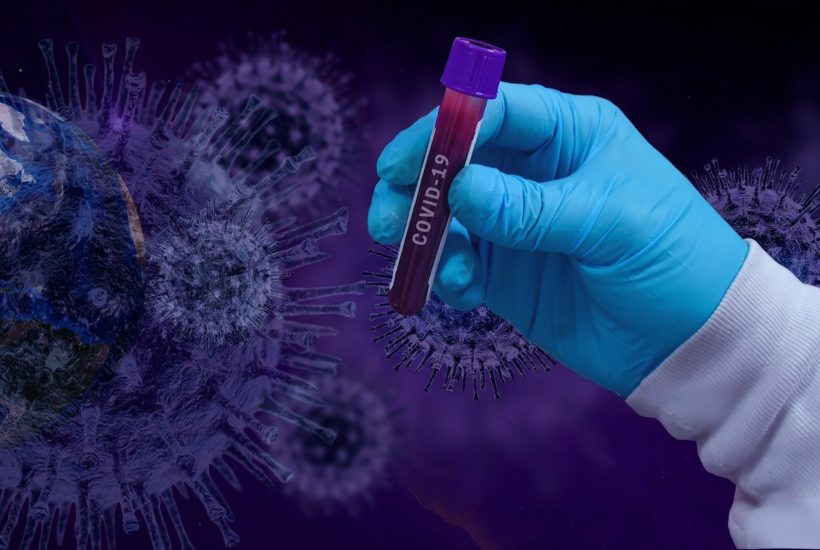Biotech
A study with a new serological method indicates a prevalence of Covid-19 of 25% in Madrid in June 2020
The serological method, called Scovam is a fluorescence-based assay that allows simultaneous detection of IgM and IgG antibodies in a microdrop of blood serum. According to the CSIC, it is a method “with high sensitivity, quantitative, scalable and automatable” for the analysis of a large number of samples. In addition, it enables digital processing of all the information obtained.

A study applying a new serological method developed by CSIC indicates that almost 25% of the population of Madrid had already been infected by SARS-CoV-2 in June 2020, so the prevalence of Covid-19 would be higher than originally thought. Researchers at the Centro de Astrobiología, a joint center of the CSIC and the Instituto Nacional de Técnica Aeroespacial (INTA), have developed this method that uses several SARS-CoV-2 proteins to detect antibodies.
Read more on the subject and find the most important economic news from around the world with our companion app, Born2Invest.
The new serological method simultaneously detects IgM and IgG antibodies in a microdrop of blood serum
The study was conducted during April and May 2020 and its results are available in the journal Microbial Biotechnology. The method, called Scovam (from SARS COV-2 Antigen Microarray), is a fluorescence-based assay that allows simultaneous detection of IgM and IgG antibodies in a microdrop of blood serum. According to the CSIC, it is a method “with high sensitivity, quantitative, scalable and automatable” for the analysis of a large number of samples. In addition, it enables digital processing of all the information obtained.
The CSIC points out that one advantage of the Scovam method over other existing methods is that it uses several of the virus proteins to detect specific antibodies. Having several viral proteins as bait increases the probability of capturing the antibodies, which makes it more reliable.
The Covid-19 prevalence study with the new serological method was carried out between April and May 2020
In addition, this method allows the identification of antigenic patterns of the virus, since not all proteins stimulate antibody production with the same efficiency. This feature is especially important for vaccine tracking and monitoring, as it makes it possible to find out, in the same assay, with which viral protein the vaccine has been developed.
The new method can be implemented to simultaneously detect other relevant markers associated with the disease. These include factors that regulate inflammation and the immune response, such as cytokines.
It allows the identification of antigenic patterns of the virus and simultaneous detection of other relevant Covid-19-associated markers
Scovam was tested in a blinded assay with positive and negative serum samples, pre-pandemic and during the pandemic, tested by two commercial methods. Subsequently, the method was validated by testing 742 sera and compared with a widely used commercial chemiluminescence-based serological assay.
The new method showed almost twice the sensitivity of the commercial method. This was confirmed four months later, after analyzing the prevalence of a subgroup of 78 positive sera. Of these, 93% were still positive with Scovam, compared to 48% with the commercial method. Some sera had antibodies to only one of the virus proteins, which would explain the false negatives observed with other methods.
Data from the Covid-19 prevalence study suggest that a quarter of the population of Madrid could have been infected by this time. That is more than 1.5 million people
Similar results were obtained with another random set of 880 serum samples from the Madrid region, showing a 26% positive rate in June 2020. The study data suggest that about a quarter of Madrid’s population could be infected by then. That is more than 1.5 million people.
The seroprevalence of the group of 78 people in which the majority reported symptoms or covid-compatible PCR between March and April 2020, who showed high antibody concentrations in June 2020, has been monitored. Although antibody concentration is decreasing over time, more than 99% of this group maintained high IgG antibody levels at 7-8 months post infection. In addition, 95.6% were still positive at 11-12 months post-infection, showing concentrations similar to some vaccinated individuals.
More than 99% maintained high IgG antibody levels at 7-8 months and 95.6% were still IgG positive at 11-12 months
Finally, Scovam is making it possible to track and monitor antibody production in people who have already been vaccinated. Initial results indicate that those who have had the disease respond with IgG antibody production five to 10 days after the first dose. In the case of people not previously exposed to the virus, the response is delayed up to 15-21 days, and sometimes up to a week after the second dose.
__
(Featured image by fernandozhiminaicela via Pixabay)
DISCLAIMER: This article was written by a third party contributor and does not reflect the opinion of Born2Invest, its management, staff or its associates. Please review our disclaimer for more information.
This article may include forward-looking statements. These forward-looking statements generally are identified by the words “believe,” “project,” “estimate,” “become,” “plan,” “will,” and similar expressions. These forward-looking statements involve known and unknown risks as well as uncertainties, including those discussed in the following cautionary statements and elsewhere in this article and on this site. Although the Company may believe that its expectations are based on reasonable assumptions, the actual results that the Company may achieve may differ materially from any forward-looking statements, which reflect the opinions of the management of the Company only as of the date hereof. Additionally, please make sure to read these important disclosures.
First published in iSanidad, a third-party contributor translated and adapted the article from the original. In case of discrepancy, the original will prevail.
Although we made reasonable efforts to provide accurate translations, some parts may be incorrect. Born2Invest assumes no responsibility for errors, omissions or ambiguities in the translations provided on this website. Any person or entity relying on translated content does so at their own risk. Born2Invest is not responsible for losses caused by such reliance on the accuracy or reliability of translated information. If you wish to report an error or inaccuracy in the translation, we encourage you to contact us.

-

 Biotech1 week ago
Biotech1 week agoBiotech Booster: €196.4M Fund to Accelerate Dutch Innovation
-

 Business5 hours ago
Business5 hours agoThe TopRanked.io Weekly Affiliate Marketing Digest [The Top VPN Affiliate Programs Roundup]
-

 Crypto1 week ago
Crypto1 week agoBitcoin Traders Bet on $140,000: Massive Bets until September
-

 Crypto2 weeks ago
Crypto2 weeks agoCaution Prevails as Bitcoin Nears All-Time High
























